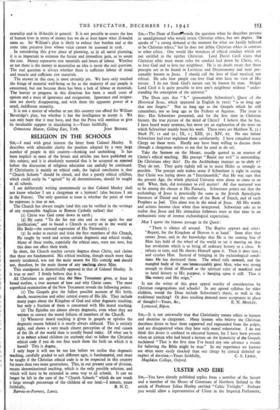Sut,—The Dean of Exeteravoids the question when he describes persons
as unenlightened who would retain Christian ethics, but not dogma. Ha speaks of "a strong demand at the moment for what are hastily believed to be Christian ethics," but he does not define Christian ethics in contrast to other ethics. One would like instances of ethical conduct which are not entitled to the epithet Christian. Lord David Cecil states that Christian ethic must mean rules for conduct laid down by Christ, viz., to love God and to love our neighbour. He is no doubt aware that those precepts are to be found in Leviticus and Deuteronomy and were pre- sumably known to Jesus. I should call the love of God mystical, not ethical. He asks how people can love God who have no view of His nature. I do not think God's nature can be known by man. Malgre Lord Cecil it is quite possible to love one's neighbour without "under- standing the conception of the universe."
The Dean says that " It" (presumably Schweitzer's Quest of the Historical Yesus, which appeased in English in 191o) "is so long ago that one forgets." Not so long ago as the Gospels which he still remembers, nor so long ago as the Fathers or Aquinas. The issue is this: Has Schweitzer presented, and for the first time in Christian history, the true picture of the mind of Christ? I believe that he has. I have heard many sermons, but never yet an explanation of the texts on which Schweitzer mainly bases his work. These texts are Matthew X, 23; Mark IV, it and 12 ; IX, I ; XIII, 30 ; XIV, 62. No one before Schweitzer had ever explained them satisfactorily. I have consulted many Clergy on these texts. Hardly any have been willing to discuss them (though a clergyman writes to me that he used to do so).
Take the Sermon on the Mount, usually quoted as an essence of Christ's ethical teaching. His precept "Resist not evil" is outstanding. Do Christians obey this? Do the Archbishops instruct us to obey it? They do not. They quite rightly tell us to resist Hitler as strongly as possible. The precept only makes sense if Schweitzer is right in saying that Christ was laying down an " Interimsethik," that He was sure that the present Age, the whole physical Universe were about to come to an end. What, then, did resistance to evil matter? All that mattered was to be among the chosen at His Parousia. Schweitzer points out that the eschatology of Jesus is practically the same as the Jewish Apocalyptic literature of Daniel and the author of the Book of Enoch, and of such Prophets as Joel. This alone was in the mind of Jesus. All His words and actions become clear when thus interpreted. Schweitzer asks us to realise that Jesus and His immediate followers were at that time in an enthusiastic state of intense eschatological expectation.
May I quote the famous passage in the Quest: "There is silence all around. The Baptist appears and cries: 'Repent, for the Kingdom of Heaven is at hand.' Soon after that comes Jesus, and in the knowledge that He is the coming Son of Man lays hold of the wheel of the world to set it moving on that last revolution which is to bring all ordinary history to a close. It refuses to turn, and He throws Himself upon it. Then it does turn ; and crushes Him. Instead of bringing in the eschatological condi- tions He has destroyed them. The wheel rolls onward, and the mangled body of the one immeasurably great Man, who was strong enough to think of Himself as the spiritual ruler of mankind and to bend history to His purpose, is hanging upon it still. That is His victory and His reign."
Is not the writer of this great appeal worthy of consideration by Christian congregations and schools? In any agreed syllabus for elder children, would the Dean include Schweitzer's thesis, as well as the traditional teaching? Or does teaching demand mere acceptance in place


























 Previous page
Previous page